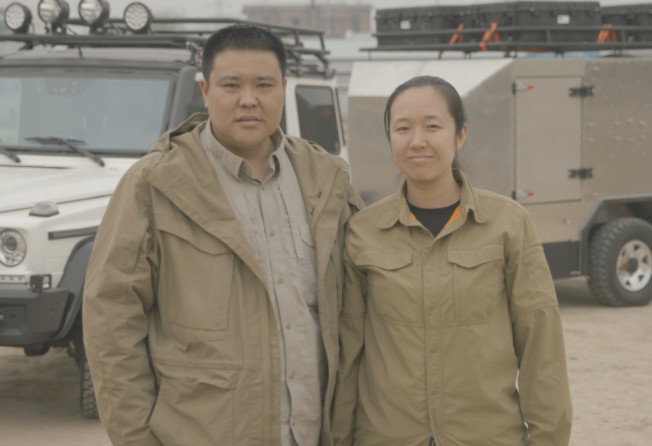Exploring world danger zones: Chinese husband and wife attract millions of online views
Zhang Xinyu and his wife's journeys to some of the world's riskiest places are filmed and attract millions of online views. While in Iraq, on his latest trip to the Middle East, he spoke to ANDREA CHEN.

Zhang Xinyu and his wife Liang Hong have travelled some of the world's most hazardous routes since 2008 - sailing around the world, visiting the site of the 1986 Chernobyl nuclear plant accident, and scrambling 300 metres into the crater of the active Marum volcano, to name just a few. Online footage of their adventures has gathered hundreds of millions of views. After the Wenchuan earthquake in 2008, they made a 10-year travel plan and decided to spend all their assets on it. In April, the couple from Beijing started off again, leading a team of nine people across 16 countries in the Middle East - one of the world's most notorious conflict zones - and North Africa.
Why did you choose to travel across the Middle East?
I made the itinerary in 2009, merely out of curiosity. Back then the mainland media had scant coverage of Muslims and Islam, and the Western media was quite biased. I'm eager to learn what it is like to live as a Muslim - what they eat, where they live, and how they meet their first love in a single-gender education system. Also I want to see the conflict areas through my own eyes, to look for answers to the questions the media has failed to solve - why the Arab countries and Israel can never end their conflicts. What I've seen is very different from what I learnt from books and the media.
What are the biggest differences?
People's attitude towards death. It might be inappropriate to say they are indifferent. But they do treat death as just another ordinary thing in their lives. We visited a family who lost 14 members when their house was bombed by the Iraqi air force by mistake in [the Islamic holy month of] Ramadan. They told me it was Allah that chose to free the departed from all these sufferings during Ramadan.
Why do people seem optimistic in your photos and video?
They are more helpless than optimistic. They know their countries will not see peace in the next decades, or their lifetime. I'm now outside an emergency room in Sadr City in Iraq. As we speak, two people who were shot have been brought to the hospital, including a teenager. His father rushed him to the emergency room in tears, then brought his body to the mortuary in tears. People here have seen too much of this. They can only choose to stay optimistic and live on.
Will you travel through areas controlled by terrorist groups?
We've already passed through the Taliban controlled areas in Pakistan and Afghanistan. We quickly drove through those areas when the militants changed shifts or went to religious services. Islamic State (IS) will be our major threat through Iraq and Syria. If we compare the Taliban to the middle-aged, IS would be like the rich post-1990 generation. If caught there would no room for negotiation. So we will not enter the IS-controlled regions.
How do you avoid being captured?
Everyone enjoys the freedom of visiting any region in the world. But we must watch out for our own safety. I was in Iraq when the mainland authorities sought the release of a Chinese university student who had been captured, and I saw how much diplomatic resources were spent on that. We only live once. It is irresponsible to put interests ahead of lives. In my own team, it is always safety first. In the most dangerous section of the journey we have around 40 security guards equipped with AK47s, heavy machine guns, and rockets. We also bought intelligence to evaluate how dangerous a region would be.
How else did you prepare?
Since my wife and I volunteered to join the search and rescue efforts after the Wenchuan earthquake, we've spent most of our time learning different skills to prepare for the trips. I learnt to drive a submarine in Russia, manufacture and maintain sail boats in France and how to fly a helicopter and paraglider. We can drive almost anything with wheels or caterpillar tracks, including tanks.
How did the quake alter your life?
I witnessed so many stories of life and death there. I met a man digging through the debris of a collapsed seven-floor building for days to look for the body of his daughter. He shared stories of his daughter with me. He said she had been assigned to a factory after graduating from vocational school, had finally passed probation and got her own room in the dormitory - but now would never live in it. I realised I should make every day of my life count and do whatever it took to make me and my family happy.
How can you afford your trip?
I run a small group corporation and our businesses range from manufacturing to catering. The daily operations are handled by my colleagues. But I'm working while on the road. I spent 36 million yuan [HK$43 million] on our first trips. This time sponsors, like Youku Tudou [a video website] will pay half of it.
How do you feel about your past videos attracting millions of views?
We never thought of doing a reality show when we started. One of our friends at Youku saw our footage and asked to buy it and make it into a travel show. I didn't expect to attract such attention online. I think people like us because we are doing something everyone has once dreamed about.